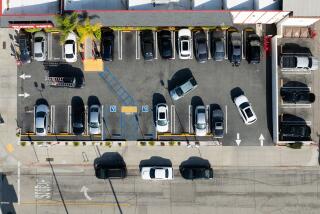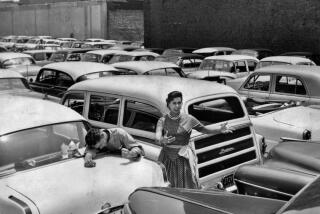A premium to park in Hong Kong
- Share via
HONG KONG — The hottest properties in this frenetic city have no walls, windows or even front doors. Forget condos, apartments and homes.
Real estate investors are scrambling for parking spaces.
Single slots are now selling for more than some modest Southern California homes. Witness the $288,000 paid in November for a parking place in a luxury apartment complex on Hong Kong Island. Or the $166,000 tab for a spot in a suburban development called Festival City. A space attached to an exclusive cliffside town house community in the ocean-view neighborhood of Repulse Bay fetched $385,000 in March.
And those are just the recorded sales.
Jacinto Tong, head of Gale Well Group, a real estate investment firm, was offered $640,000 each for his two ground-floor parking spaces in an office building in the Wan Chai commercial district. He said he turned it down because he likes parking his Mercedes S500 on prime real estate near the elevator. The other spot is reserved for his driver.
“This market has gone crazy,” Tong said. “These spaces aren’t worth that much money.”
Parking has long been a prized commodity in land-scarce Hong Kong. Tenants outnumber available slots by as much as 20 to 1 in some residential buildings, creating strong demand for spaces. But experts say the recent price explosion is the unintended fallout from a government effort to cool red-hot housing values.
Home prices in the former British colony have nearly doubled since early 2009, driven largely by wealthy buyers from mainland China. A typical 600-square-foot apartment now costs about $577,000, according to property broker Savills. Prices soar into the millions in parts of Hong Kong Island, the city’s commercial and financial center.
Under pressure to slow housing costs, the Hong Kong government in the last year introduced curbs aimed at speculators. Starting in late October, a 15% “stamp duty” was levied on sales to nonpermanent Hong Kong residents. A tax of 20% was imposed on properties resold within six months of purchase.
The result: Investors channeled their money into parking spaces, where the new rules did not apply.
Parking space transactions in November rose more than fivefold compared with a year earlier at 1,640, according to Centaline, one of the largest real estate firms in Hong Kong. The average price of each space sold was $92,307, up 20% from a year earlier.
“Hong Kong people always have to invest in something,” said Shih Wing-ching, Centaline’s chairman. “Not many were willing to pay the stamp duty, so they needed to find something else.”
Naturally, Hong Kong banks offer mortgages for parking spaces. Small lenders are reportedly battling for customers with ever lower-interest loans.
Some investors are looking to flip for a quick profit. Others are looking for a steady source of rental income. At nearly $745 a month, the average cost of leasing a space in Hong Kong in 2011 was behind only London and Zurich, according to Colliers International.
The International Monetary Fund recently warned that soaring real estate values posed the biggest risk to Hong Kong’s economy should there be a major correction.
However, unlike in the U.S. subprime mortgage fiasco, most of Hong Kong’s buyers aren’t highly leveraged; many deals are all cash.
The local market is not subject to oversupply either. Since a market crash in 1997, the Hong Kong government has been cautious about freeing up remaining land in the largely hilly, 426-square-mile territory. As a result, Hong Kong suffers from an inadequate supply of housing, analysts say.
The lofty prices paid for parking berths are unthinkable for working-class Hong Kong residents -- many of whom are finding their city painfully unaffordable. The city’s wealth gap is now at a 30-year high. The credibility of the local government rests partly on its ability to shrink the divide and defuse growing animosity toward rich mainlanders.
Real estate has become a symbol of that struggle and a lightning rod for criticism. The city’s leader, Leung Chun-ying, is enmeshed in a scandal over illegal additions to his mansion on Victoria Peak.
Meanwhile, a shortage of affordable housing has swollen the ranks of families living in squalid rented rooms in what are known here as subdivided apartments.
Lee Pak-shun rents a room with his mother and sister in a space barely big enough for a bunk bed and a desk in a grimy section of Mong Kok, one of the most densely populated places in the world. About 30 other people are crammed in beside them on the fifth floor of a dilapidated building. Everyone shares a single squat toilet. Rooms are divided by thin plywood.
“People go crazy living in such a small place,” said Lee, a 26-year-old bakery employee, who pays $192 a month for the room -- which is about half the size of a typical parking space.
“It feels like the rich are getting richer and the poor poorer. Some people here have so much money to speculate in property and speculate in parking spaces. They’re cooking something up every day.”
Analysts say Hong Hong’s parking space bubble is bound to burst. Developers have been releasing new spaces onto the market. Investors are also finding it harder to flip spaces because of rules in some property developments that restrict potential buyers to tenants only.
“I think this is a short-term phenomenon,” said Shih, of Centaline. “It won’t happen again.”
Not everyone is convinced. Francis Liu, an economist at Hong Kong University of Science and Technology, thinks the next big investment scheme could be taxi licenses -- the costs of which have been spiraling up to $900,000.
“Mainlanders like to invest in them because they’re easy to buy and sell,” Liu said. “It’s the same concept as parking spaces.”
--
Special correspondent Shirley Zhao in Hong Kong contributed to this report.
More to Read
Inside the business of entertainment
The Wide Shot brings you news, analysis and insights on everything from streaming wars to production — and what it all means for the future.
You may occasionally receive promotional content from the Los Angeles Times.











